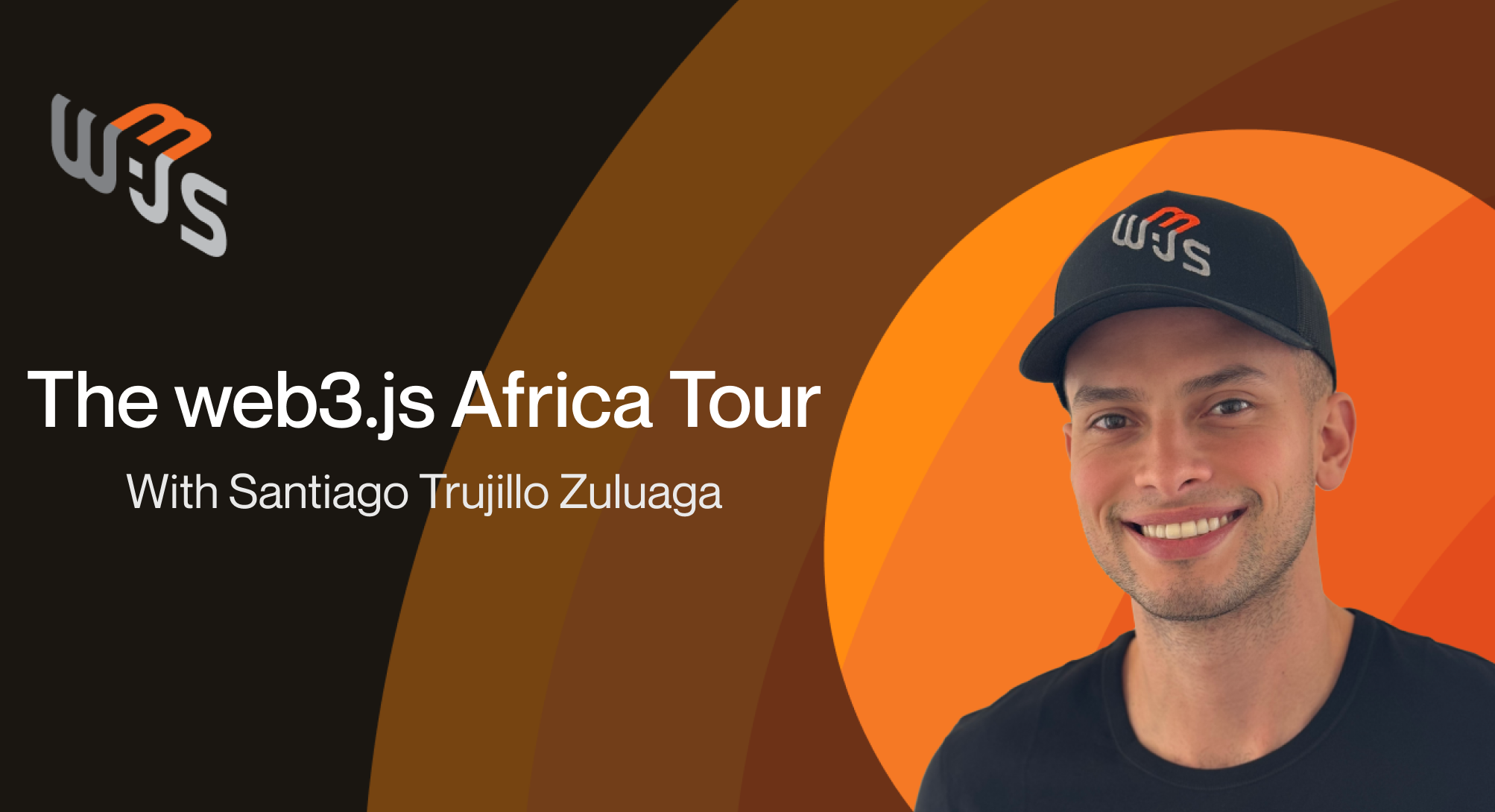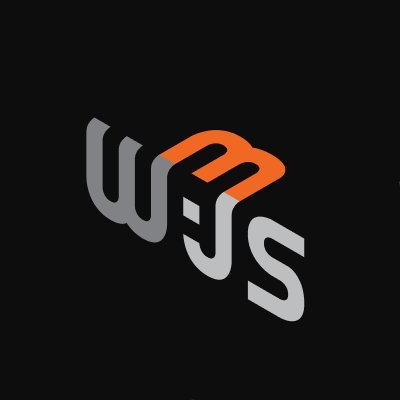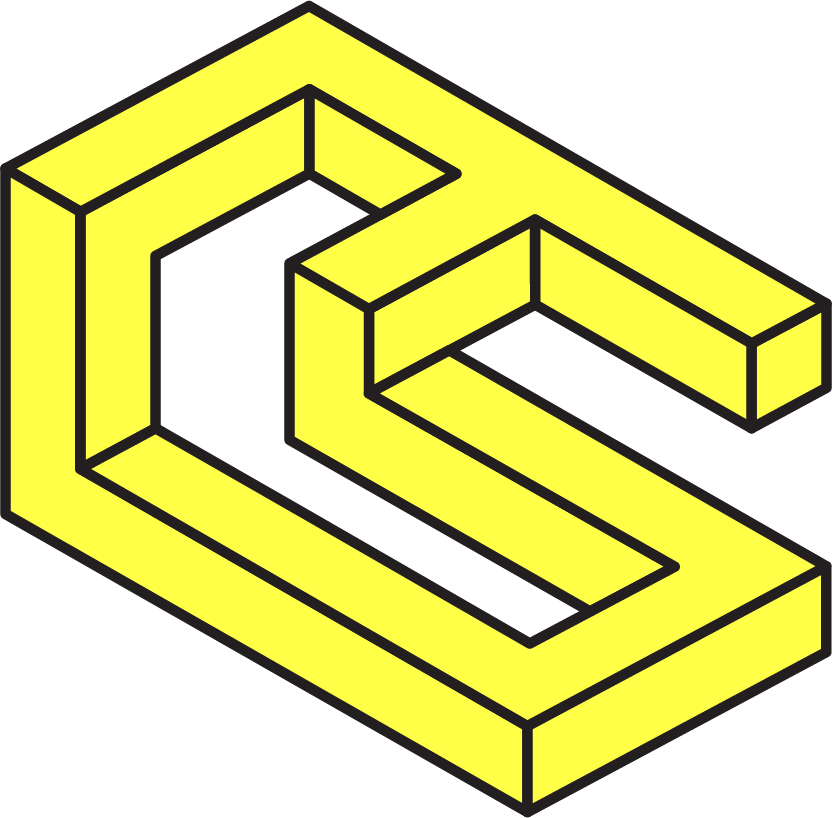The web3.js Africa Tour
Across Ghana, Nigeria, Kenya, and Uganda, I led web3.js workshops, guiding developers through hands-on learning and connecting local talent to the global web3 space. Follow along to see how the journey unfolded.

Why Africa?
In 2019, I embarked on my first trip to Africa, planning to volunteer for three weeks. Three weeks quickly turned into eight months spent in Kenya and Uganda, during which I learned English, spent time with children from an orphanage, played soccer, and immersed myself in the culture and its people.
After my first trip, I set a goal for myself: to someday return to Africa and continue making a positive impact. And this year, I was finally able to achieve that goal!
Since joining ChainSafe as a web3.js DevRel, I've embraced the responsibility of being the DevRel for one of Ethereum's most important public goods. For me, it's more than just a 'JavaScript library'—it's about driving real societal change and growing the ecosystem together.
Ambassadors program
When I started the web3.js ambassador program, I didn't expect it to take off like this. Three hundred developers applied, all independently, and without any monetary incentives—they just wanted to help us grow Ethereum. What I didn't expect was this overwhelming response would eventually set the web3.js Africa tour into motion.
First times
This tour was full of fun and memorable moments, but for me, the most impactful were the first times. One that I will never forget was being with my good friend and one of the incredible web3.js ambassadors, Gideon, for his first flight.
It wasn't just about Gideon stepping onto a plane, either—it represented the entire mission: elevating and connecting talented individuals from Ghana, Nigeria, Kenya, and Uganda to the global web3 community.
Sharing @GideonMaoga’s first-ever flight is a reminder that web3 is about connecting with people, forging relationships, creating impact, and having a lot of fun ‘first times’
— Santiago Trujillo Zuluaga 🇨🇴 (@SantiagoDevRel) September 15, 2024
Proud and grateful to be here today, thank you @ChainSafeth
Landed in Nairobi!🛬 pic.twitter.com/FLsT6LoXYG
It was also a significant milestone for our ambassadors in Nigeria, as they conducted their first workshops and delivered their inaugural talks at the web3 Lagos Conference. These experiences were truly unforgettable.
Each stop on our tour was not just an occasion to introduce web3.js but a chance to weave a new fabric of collaboration and innovation among developers.
Ghana: The Beginning of Something Bigger
Our journey across Africa started in Accra, Ghana, where we hosted our first four workshops.
The first workshop, held on August 24th, focused on building decentralized applications (dApps) using web3.js plugins, particularly with the Chainlink plugin. The participants, from beginners to seasoned programmers, built functional dApps with USDC 800 in bounties to be won.
We worked with nearly 40 developers, bumping the number of Chainlink plugin downloads from 1-7/week to 100/week.
Here are a few previews of the coin conversion dApps created during the workshop:
- Crypto Price Converter by Jovells
- Mowblox Coin Converter by Emmanuel Darko
- Crypto Converter by $pacegod
On August 28th, we ran two different workshops. The first, hosted in the morning, was aimed at beginners as a more intimate session with 15 developers. This was an introductory course to the basics of web3.js and deploying dApps using Solidity and React. The smaller group size allowed us to spend more time with the individual participants, letting them take the time to get answers to all their pressing questions.
Later that day, another 25 developers joined us for the next workshop, learning to build custom web3.js plugins. These plugins are extensions that allow developers to enhance the base web3.js library, adding new functionalities tailored to specific needs. These may involve creating wrappers for particular contracts, adding extra features to RPC methods, integrating external libraries, or extending the capabilities of existing web3.js methods.

This session gave participants the knowledge and tools to create plugins and contribute to the growing web3 ecosystem, making it easier to work with smart contracts or access blockchain data.
Our final Ghana workshop, held on August 29th, drew over 20 developers. This session emphasized using web3.js plugins like zksync, swisstronik, and ORA, providing hands-on experience in enhancing functionality and efficiency when building dApps.
Each workshop equipped developers with the technical skills needed to navigate the web3 landscape and fostered a sense of community among the participants. It was inspiring to see ideas being exchanged, collaborations forming, and a genuine curiosity about the potential impacts of their new skills on local and global scales.
While we were running the workshops, I had the pleasure of meeting some of the best and most enthusiastic developers at ETHAccra and @mowblox. Their warmth and inspiration were infectious, and I knew I had to bring them to Web3LagosCon in Nigeria.
We can all grow together in web3 by sharing what we can—whether it’s time, mentorship, connections, or opportunities.
— Santiago Trujillo Zuluaga 🇨🇴 (@SantiagoDevRel) September 10, 2024
2 weeks ago, I met these incredible people at @ETHAccra and @mowblox — warm, inspiring, and full of enthusiasm, and I wanted to take them to @Web3LagosCon (they… pic.twitter.com/3Y8v1vHuaZ
It was incredible to feel part of the local community, and seeing it all come together first-hand was unreal. This was what the whole tour was about—bringing together communities—and we were still only in the first leg of the journey!
This stop in Ghana set a solid foundation for the rest of the tour. It was clear from the start that we were onto something big—a movement not just about coding and smart contracts but about empowering people with the tools to innovate, build meaningful communities, and shape the future of web3.
Thank you to everyone who made me feel welcome on our first stop! The people I came across only managed to make my smile bigger. Even simple things like riding a bike across Accra became such special moments because of the people I was with.
It’s really risky to come to Africa…#web3jsInGhana @ChainSafeth pic.twitter.com/Nbleq3RD6F
— Santiago Trujillo Zuluaga 🇨🇴 (@SantiagoDevRel) August 30, 2024
Nigeria: Innovating Together
Our next stop was Lagos!
We were able to set up another three workshops around web3LagosCon. The workshop material was progressive this time, as the first two sessions built on each other. They started with an introduction to plugins and ended with a session about building apps with them.
On September 1st, our first session served as our foot-in-the-door introductory course, allowing 40 developers to familiarize themselves with web3.js and its plugin system. We wanted to introduce them to web3.js plugins in a chilled, laid-back environment. We learnt quickly that it's only once attendees get comfortable that their confidence shines through. Especially when you're in a room filled with strangers trying to get a handle on brand-new concepts, it can be intimidating to ask 'dumb' questions. Once you break out of that fear and realize that everyone in the room has the same question, that no question is dumb, the real learning begins.
The following day, 50 developers gathered, some to put their new skills to the test. This workshop involved getting into teams to build dApps using web3.js plugins. It's always nice to see people throwing their ideas together and making something as a group. It was empowering to watch really just how quickly the teams came together.
Something you learn working for a startup is just how important team dynamics can be. You could have the best idea in the world, but, ultimately, the execution depends on how well your team functions together. This isn't a new concept either. There's a reason they make you do group projects in school. While the stakes are higher in the real world, working with others is a fundamental skill, especially when working with open-source tools. The entire ecosystem depends on individuals worldwide working on things alongside others. Not only is teamwork essential in your own life, but it's also essential for maintaining a thriving web3.
Our journey continued on September 5th at the Filecoin Hacker House, where I spent the morning with ten developers. This session was similar to the August 28th workshop in Accra. However, instead of a small group of beginners, this one was aimed at an intimate group of experienced blockchain developers.
The culmination of our efforts in Nigeria was not just in the skills imparted or the projects initiated but in the strengthened sense of community. Developers left the workshops with new tools, connections, and a reinforced belief in the transformative power of collaboration within the web3 ecosystem.
Our journey in Nigeria reinforced a key message: innovation knows no bounds when diverse minds come together with a shared purpose and the right tools. This stop was a testament to the power of collective creativity and the boundless potential of the web3 space when leveraged collaboratively.
And that's not even mentioning how much fun we had in Lagos! Forget the web3 community for a moment––everyone I met in Lagos was so kind and welcoming! It was non-stop fun and positive energy! And, of course, more boda boda 🏍️🏍️
“Don’t take motorbikes in Lagos”
— Santiago Trujillo Zuluaga 🇨🇴 (@SantiagoDevRel) September 4, 2024
“Be careful in Nigeria, they will steal your phone”
Me carrying my phone and laptop in the motorbike, with strangers in every corner: pic.twitter.com/DB28P3v4xG
Kenya: Turning Ideas into Reality
Next stop: Nairobi!
Here, we ran another five workshops leading into ETHSafari. The biggest difference in these sessions was in the audience, with three explicitly aimed at students from Zetech, JKUAT, and CUEA Universities.
But before anything, this leg of the journey began with a deeply personal reunion. Five years ago, during my first visit to Kenya, I volunteered at a local school where I met a remarkable individual, William, who helped me fall in love with Africa. The same enthusiasm and warmth greeted me at the airport this year as he picked me up.
5 years ago, this guy made me fall in love with Africa. My first time here was volunteering at his school
— Santiago Trujillo Zuluaga 🇨🇴 (@SantiagoDevRel) September 8, 2024
5 years later, he's picking me up at the airport again. I’m back with more energy, more purpose, and the same enthusiasm!
Good to be back in Kenya!🇰🇪❤️
I will be speaking… pic.twitter.com/5BS6QtuzEV
After running seven different workshops, travelling through two unfamiliar countries, and meeting hundreds of new people over a couple of conferences in just over two weeks, a familiar face was just the jump-start I needed! It's tough to keep going hard when you're firing on all cylinders every day. Thankfully, I had support from some of the most incredible people in the world to keep me charged and ready for even more adventures.
Our first workshop in Nairobi was on September 9th as part of the ETHSafari hackathon. Thirty developers joined us, and six took home prizes worth USDC 5000!
Following the momentum, on September 14th, we bused over 8 hours to Kilifi for the second part of ETHSafari (with only one breakdown on the way).
This is how our male logic works: the more people looking at the car, the faster it gets fixed
— Santiago Trujillo Zuluaga 🇨🇴 (@SantiagoDevRel) September 11, 2024
And yeah, after 20 web3 engineers looked at it, it worked! 🚌
The adventures at @ethsafari 🦓 never end pic.twitter.com/upp3CxJTZy
We ran another workshop there, teaching developers how to build web3.js plugins. Attended by 20 developers, this session was loads of fun! And being so close to the coast was amazing. The ocean is always an incredible reward.
After that, we returned to Nairobi, hosting workshops at three universities. These were a bit more high-level and beginner-focused sessions. We covered the basics of blockchain and how libraries like web3.js are your gateways into the development world of web3.
It started on September 17th, when we visited Zetech University, with 60 developers and students attending in person. This was followed by sessions at JKUAT University on September 19th with about 30 attendees and CUEA University on September 20th, also drawing a crowd of roughly 30 participants. As an added bonus, we were also able to stream and record these sessions, drawing in another 150 live attendees!
These university workshops were not only about teaching but also about inspiring the next generation of developers to explore and innovate within the blockchain space. Interacting with students and faculty provided a fresh perspective on the needs and opportunities within the Kenyan market, enriching the dialogue around blockchain technology's role in economic development.
Workshop + tasty ugali = happy devs https://t.co/paYtE0bwWL pic.twitter.com/381SH53Hro
— Santiago Trujillo Zuluaga 🇨🇴 (@SantiagoDevRel) September 17, 2024
During our time in Kenya, I also managed to speak at ETHSafari three times: at the hackathon and main stage in Nairobi, as well as at the workshop stage in Kilifi. Here, I shared insights about the web3.js bounties and discussed the potential for blockchain to drive significant social and economic change. This platform allowed me to showcase the practical benefits of our work and engage with the community on a deeper level, exploring how web3 could be leveraged to create inclusive and sustainable growth in Africa.
Our journey through Kenya was a vibrant tapestry of technical workshops, heartfelt reunions, and strategic discussions. It was a profound reminder of how technology can lead to meaningful change when paired with genuine human connections. The enthusiasm and innovative ideas showcased by the Kenyan developers were a testament to the transformative potential of web3 technologies when coupled with local knowledge and expertise.
Uganda: The “final” stop
And finally, one of my favorite countries: Uganda!
I was meant to go to Uganda for one week of vacation and do some tourism, but after visiting Ghana, Nigeria, and Kenya, the Ugandan community asked me if I could host a workshop in Kampala, and of course, I was happy to do it!
On September 28th, we headed to the Innovation Village in Kampala, where more than 20 developers attended a session to learn about building dApps with ZKsync and Swisstronik plugins. Here, we were able to give out the remaining USDC 1000 in bounties to six projects.
Kenya: The real “final” stop
After running all these workshops, I got a last-minute request from @0xodus, a Brave ambassador and student at DEKUT, asking if I could come to their university for a “Getting Started with Ethereum” workshop. I'm always ready to go where I can make an impact and where people are eager to learn, no matter the time, sacrifices, or road trips.
Our final stop was DEKUT University, roughly four hours from Nairobi by road. We got there, grabbed some chapati to warm up, and started out with some Solidity and Remix IDE. In the second part of the workshop, we moved on to building dApps with React and web3.js.
That's a wrap!
This journey across Africa has been nothing short of transformative—for the developers we met and for myself. From Ghana to Uganda, every workshop, every handshake, and every line of code contributed to something much bigger than just building decentralized apps. It was about building a community, empowering individuals, and shaping the future of web3 together. The passion and talent I witnessed reaffirmed my belief that real innovation knows no borders. This is just the beginning, and I can't wait to see how the seeds we've planted continue to grow.
I want to extend a heartfelt thank you to everyone who made this journey possible—our incredible web3.js ambassadors, the passionate developers who joined us, and the local communities that welcomed us with open arms. Your energy, curiosity, and drive are what make these moments unforgettable. Together, we're not just building dapps––we're building the future of web3, one connection at a time. Thank you for being part of this incredible journey!
Learn more about web3.js
If you want to explore web3.js further, all functions with code examples can be found in the web3.js docs:
👉 Follow @web3_js on Twitter for updates!
Still have questions? You can connect with other developers and get web3.js support in the ChainSafe Discord channel.
Just go to #web3js-general for all your web3.js questions. We hope to see you there soon! 😀
About ChainSafe
ChainSafe is a leading blockchain research and development firm specializing in protocol engineering, cross-chain interoperability, and web3 gaming. Alongside its contributions to major ecosystems such as Ethereum, Polkadot, and Filecoin, ChainSafe creates solutions for developers across the web3 space utilizing expertise in gaming, interoperability, and decentralized storage. As part of its mission to build innovative products for users and improved tooling for developers, ChainSafe embodies an open-source and community-oriented ethos to advance the future of the internet.
Website | Twitter | Linkedin | GitHub | Discord | YouTube | Newsletter


